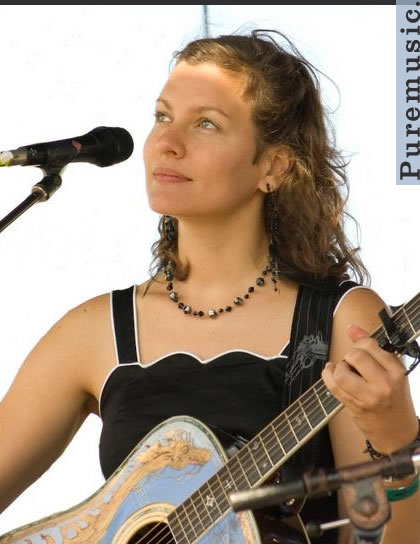
A Conversation with Antje Duvekot
Puremusic: We like The Near Demise of the High Wire Dancer very much.
Antje Duvekot: Oh, thank you.
PM: That's a swell record. How long has that been out?
AD: It has not been out very long yet at all, basically two weeks, more or less.
PM: Oh, wow. So it's an exciting time.
AD: Yeah.
PM: How is it going with folk and Triple A? Are the radio people picking up on any of the cuts there?
AD: Yeah. We don't have an official radio promoter, so we've just been sending it out ourselves, but we still have gotten quite a bit of response from Triple A Radio. Like WXPN in Philadelphia is playing it, I think, and some internet radio like Radio Paradise.
PM: Yeah, if you're getting XPN, that's good, because so many people follow their lead.
AD: Yeah, and of course in Boston we have it on WERS and on WUMB.
PM: Yeah, they love you up there. Is Boston your home, or Philly, now?
AD: Oh, it's Boston. I used to live in Philly, but I've been in Boston for about three years now.
PM: Right. So I understand, though, that you were born in Heidelberg. Is that right?
AD: Yep, Heidelberg, Germany, born and raised.
PM: My brother is a singer songwriter there, strangely enough, from Philly, kind of a reverse route.
AD: Oh, no way.
PM: Yeah, it's weird, right? When did you leave Heidelberg, and where for?
AD: Well, I guess I didn't really leave Heidelberg. I was 13 years old, so it was my parents that took me to Delaware. Basically my mother divorced my father and decided to move us all to Delaware, that's me and my brother. So that's when that happened. Not really my choice. So I spent the rest of my life in America, ever since that time.
PM: Yeah, the only other person that comes to mind from Delaware is Richard Julian. Have you run into him in your travels?
AD: Yeah, sure. I didn't even know he was from Delaware.
PM: Yeah, I think that's where he originally hailed from.
AD: Oh, cool.
PM: What a guy he is.
AD: He's great.
PM: So where and how did music start to take a hold of you, and how did you deal with that when that happened?
AD: Well, I guess it always took a hold of me ever since I was born. I just loved it, the minute I was born. I remember singing when I was little.
PM: That's amazing. I've never had somebody say to that me. That's really cool.
AD: Really?
PM: Yeah.
AD: Oh, no, as I child I would like leave the playground and ignore my peers just so I could sit around the campfire and looking for the adults playing music. I was pretty obsessed with it. But then as to writing, that happened a lot later, probably when I was a teenager I finally discovered the sort of therapeutic value in writing songs.
PM: Yeah, it's huge, right?
AD: Yeah.
PM: Listening to the songs of others and writing our own, yeah, it's the best thing.
AD: Yeah.
PM: Do you remember the first person that really reacted strongly to a tune of yours, and how that affected you at the time?
AD: Well, I was just starting to write songs, and I was living in Delaware at the time, and I was listening to WXPN, actually. And there's a DJ called Gene Shay there.
PM: Sure, we know Gene.
AD: Oh, do you know Gene? He's been there for ages. So he would sort of moderate some of the open mikes around the Philadelphia area that I frequented in the beginning. And so he sort of showed some really positive response to me. They called me up on stage at one of the Philly Folk Festival concerts. And so he was encouraging me. So I actually remember calling him --
PM: He called you on stage at the Philly Folk Festival?
AD: It wasn't the Philly Folk Festival, per se, it was like one of their concerts that happened during the spring. It was just a concert. So Gene Shay sort of gave me a little bit of exposure when I was just like 17 or 18. I had just written my very first song, basically. So my parents were extremely opposed to my music. I remember calling Gene Shay on the phone and asking him, "Gene, do you think I can make it in music? You need to tell me the answer so I can tell my parents." So Gene Shay said, "Yes, I think you can." Which made me, in turn -- gave me more drive to try and do it. And at that point, of course, I was still pretty wet behind the ears, and not that good of a writer. But I think Gene Shay just sort of thought that I could get it together in time.
PM: Wow. I mean, and that was an amazing gift that he gave you there, and that he's given to other really promising people. He's just a really beautiful light for acoustic music in Philly.
AD: Yeah, he's a really good patron of the arts down there.
PM: He's really done a lot. continue
print
(pdf) listen to clips
puremusic home

